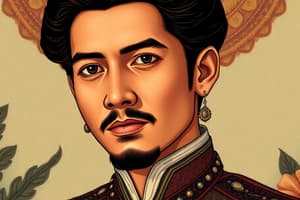Podcast
Questions and Answers
What did Father Blumentritt establish in 1859?
What did Father Blumentritt establish in 1859?
- A trading post
- A hospital
- Ateneo Municipal de Manila (correct)
- University of Santo Tomas
Who proposed a constitution granting more rights and autonomy to the Filipino people?
Who proposed a constitution granting more rights and autonomy to the Filipino people?
- Sebastian Hidalgo y Robrez (correct)
- Father Blumentritt
- Ferdinand Magellan
- Jose Rizal
What did Jose Rizal use as a means to express dissent?
What did Jose Rizal use as a means to express dissent?
- Dancing
- Writing (correct)
- Painting
- Sculpting
Which of Rizal's works exposed the exploitative nature of Spanish rule?
Which of Rizal's works exposed the exploitative nature of Spanish rule?
What did Rizal advocate for regarding education?
What did Rizal advocate for regarding education?
What did intellectuals find solace and strength in during times of adversity?
What did intellectuals find solace and strength in during times of adversity?
During the late 19th century, who was a prominent figure known for his intellectual contributions and revolutionary ideas in the Philippines?
During the late 19th century, who was a prominent figure known for his intellectual contributions and revolutionary ideas in the Philippines?
How did Spain maintain control over the Philippines during their colonial reign?
How did Spain maintain control over the Philippines during their colonial reign?
What were some of the hardships faced by many Filipinos under Spanish colonial rule?
What were some of the hardships faced by many Filipinos under Spanish colonial rule?
How did Spanish authorities restrict access to knowledge in the Philippines?
How did Spanish authorities restrict access to knowledge in the Philippines?
What type of activities were encouraged by the climate of strict censorship in the Philippines under Spanish rule?
What type of activities were encouraged by the climate of strict censorship in the Philippines under Spanish rule?
Which historical figure was inspired by instances of reformist thinking despite rigid suppression in the Philippines?
Which historical figure was inspired by instances of reformist thinking despite rigid suppression in the Philippines?
Flashcards are hidden until you start studying
Study Notes
Social and Political Conditions in José Rizal's Time
As we delve into the late 19th century of the Philippine archipelago, our lens focuses on Jose Rizal – a renowned intellectual, writer, and revolutionary whose perspectives illuminate the complex social and political landscape of his era. To appreciate the extent of his influence and ideas, let us examine these aspects within the span of his life amidst the backdrop of Spanish colonial rule.
Colonial Rule and its Imprint
Spain commenced its colonial reign over the Philippines around 1571, following Magellan’s arrival in 1521. Over three centuries later, Spain remained the dominant political force, maintaining control through military occupation backed by religious dogma. Though some local elites amassed wealth and status under this system, many Filipinos endured considerable hardship due to taxation burdens, land confiscations, and forced labor practices like repartimiento and peonage.
Spanish authorities exerted strict censorship over local publications and education systems, often restricting access to knowledge deemed threatening to their hold on power. This climate encouraged clandestine activities, secret societies, and covert discussion groups where like-minded individuals could articulate their grievances against oppression and advocate for change.
Inspirational Reformers
Despite rigid suppression, there were instances of reformist thinking that inspired figures like Jose Rizal. One such example was Father Blumentritt, who established the Ateneo Municipal de Manila (later renamed University of Santo Tomas) in 1859, providing opportunities for higher learning and offering courses in science and philosophy – subjects previously prohibited.
Another catalyst for progressive thought during this time was Sebastian Hidalgo y Robrez, a Basque priest, who proposed a constitution granting more rights and autonomy to the Filipino people. His work demonstrated that it wasn’t impossible to challenge colonial authority, even if it sometimes meant facing severe consequences.
Literature and Learning
In the face of adversity, intellectuals found solace and strength in literature and public discourse. Rizal himself used writing as a means to express dissent and shed light upon the plight of his fellow countrymen. His most famous works, including novels like "Noli Me Tangere," reveal the stark realities of daily life, exposing the exploitative nature of Spanish rule while simultaneously promoting national unity and pride among Filipinos.
Rizal recognized the importance of literacy as a pathway towards emancipation. He advocated for mass education and encouraged the development of native languages, firmly believing that a well-read populace would ultimately form the foundation of any successful movement for independence.
By understanding the intricate dynamics between social and political conditions in the Philippines during the 19th century, we can better appreciate Jose Rizal's contributions to shaping the course of history and inspiring generations to come. As we continue exploring the depth and breadth of Rizal's impactful legacy, we also reaffirm the ongoing quest for freedom, justice, and equality in the modern world.
Studying That Suits You
Use AI to generate personalized quizzes and flashcards to suit your learning preferences.




